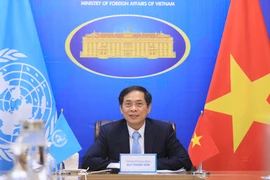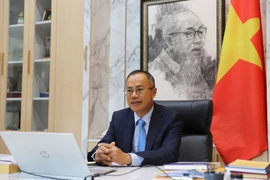Bangkok (VNA) – Deputy Prime Minister Vu Duc Dam addressed the opening of the78th session of the Economic and Social Commission for Asia and the Pacific(ESCAP) held in Bangkok on May 23, which he is attending at the invitation of ArmidaSalsiah Alisjahbana, United Nations Under Secretary General and Executive Secretary ofESCAP.
Guided by the theme “A common agenda to advance sustainabledevelopment in Asia and the Pacific”, the annual session brought togetherleaders, senior government officials and about 700 representatives of 51countries and territories which are ESCAP members, and President of the UN General Assembly Abdulla Shahid and UN Secretary-General António Guterres.
In his speech, Deputy PM Dam underlined the special meaningof this year’s session which marks the 75th founding anniversary of ESCAP, andupheld the Commission’s contributions to socio-economic development of theregion which have lifted hundreds of millions out of poverty and seen thedevelopment of some of the world’s large and most dynamic economies.
He expressed a concern that countries, particularlydeveloping ones, are struggling with the huge multi-faceted impacts of theCOVID-19 pandemic, natural disasters and climate change. They are also encountering many difficulties in accessing resources for recovery, green growth, andsustainable development.
Against this backdrop, Dam suggested a common agenda forcountries to promote sustainable development in the region.
Firstly, it is essential to place the people at the centre ofall activities, assist countries in building a social welfare system to ensurethat people have full access to basic services and employment, build capacityin healthcare preparedness and resilience, and promote gender equality.
Countries also need to strengthen regional connectivity,particularly in transport, energy, IT and communications; ensure supply chainresilience; promote digital economy; and narrow the digital gap.
Furthermore, it is crucial to promote innovation and mobiliseresources to realise initiatives, transition to a low-carbon growth model,develop green and circular economy, and respond to climate change, throughpromoting partnerships, advancing multilateral initiatives and closecooperation with international and regional organisations, including ASEAN.
He highlighted that Vietnam’s efforts to fulfil theSustainable Development Goals have also yielded positive outcomes.
According to the 2021 Sustainable Development Report, Vietnamis ranked 51st out of the 165 countries, jumping 30 places compared to 5 years ago.The country has managed to contain the COVID-19 pandemic, and transitioned tosafe and flexible adaptation.
Dam took the occasion to thank the international community, including the UN and ESCAP in particular, for the invaluable support to Vietnam.
“We hope to continue receiving this cooperation andassistance for socio-economic recovery to realise our aspiration for nationaldevelopment, and meet the SDGs and Vietnam’s commitments at the COP26, includingthe target of net zero emissions by 2050,” he stated.
Vietnam will continue to actively, responsibly andeffectively contribute to ESCAP’s efforts and the UN as a whole, for peace,stability, sustainable and inclusive development, in order to leave no onebehind across the Asia-Pacific and the world.
During the session, the Vietnamese Deputy PM met UNUnder Secretary General and Executive Secretary of ESCAP Armida SalsiahAlisjahbana.
He affirmed support for the Bangkok announcement adopted atthis year’s session, including the introduction of a common agenda withspecific courses of action to promote sustainable development in the region.
Dam asked ESCAP to help developing countries, including Vietnam,in speeding up the realisation of SDGs.
For her part, Armida spoke highly of Vietnam’s role in and contributionsto ESCAP, affirming that the Commission stands ready to support the country in realisingSDGs, especially via training and data empowerment.
Established 1947, ESCAP is one of the five regionalcommissions of the UN Economic and Social Council (ECOSOC). The commission promotes cooperation among its 53 member states and nine associatemembers in pursuit of solutions to sustainable development challenges.
The annual session will be an opportunity to reviewachievements of the Asia-Pacific region in socio-economic development anddiscuss future cooperation and linkage to deal with challenges./.






























